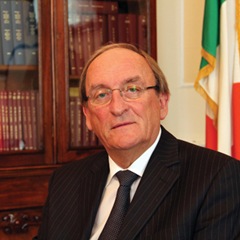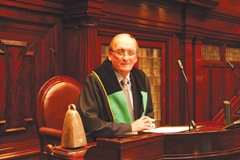Ceann Comhairle Seán Barrett
 Seán Barrett, Ceann Comhairle of the 31st Dáil, discusses his role and views on parliamentary reform with Owen McQuade.
Seán Barrett, Ceann Comhairle of the 31st Dáil, discusses his role and views on parliamentary reform with Owen McQuade.
The role of the Ceann Comhairle is to be “the sole judge of order in the House” and Seán Barrett is “honoured” to have been given the role.
The Ceann Comhairle’s powers and functions include calling on members to speak and ensuring all speeches are addressed to the Chair; putting questions to the House, supervising divisions (votes) and declaring the results; suppressing disorder, enforcing prompt obedience to rulings and ordering Members to withdraw from the House or suspending them if necessary; and suspending or adjourning the House in the case of ‘great disorder’.
The office of Ceann Comhairle is the third highest constitutional office in the land. He is a member of the Council of State (the body established by the Constitution of Ireland to advise the President in the exercise of their reserve powers); and thePresidential Commission (a collective vice-presidency of Ireland).
He is also Chairman of the Public Appointments Commission, the Oireachtas Commission and the Committee on Procedures and Privileges and will co-chair the North/South Parliamentary Forum with the Speaker of the Northern Ireland Assembly if the body is officially established.
In addition, he has the constitutional role of certifying Money Bills (bills with fiscal implications). Under the Electoral Acts, he also has a role as an ex-officio member of the Appeals Board, “which is established to decide any doubt, dispute or question that may arise in connection to the registration of political parties.”
The fact that he was unanimously elected was “rewarding” and allowed him to “start off on a footing where I was acceptable to all sides of the House.” The “vast experience” he has acquired during his political career, as Government and Opposition Chief Whip, Minister for Defence (from 1995-1997) and an opposition foreign affairs spokesman has “been of great assistance” to Barrett.
The main difficulty he faces is “trying to ensure that, without being dogmatic, you allow people to have their say, but without breaking the rules of the House.” He adds that it is most important “not to impose your authority but to bring order.” He explains that: “You’re there to make certain that people have fair play and are given an opportunity to express their views and ask questions.”
Initially, for any new Ceann Comhairle, “it’s a question of people understanding your style and they learn to have confidence in you that you’re going to give them a fair hearing,” Barrett contends. From his time in Government he realises that “naturally, [members] will try to push out the boat a little bit until somebody says ‘stop’.”
Debates
 Barrett believes that there is a need to reform the way the Dáil operates and to make the executive more accountable to Parliament.
Barrett believes that there is a need to reform the way the Dáil operates and to make the executive more accountable to Parliament.
“I feel very strongly that parliament should protect its role to debate properly the proposals of the executive,” he states.
When it is put to him that various TDs have voiced concern at the use of the guillotine to cut debating time and get legislation through quickly (as with the Finance (No 2) Bill), Barrett intends to discuss that at the Procedures and Privileges Committee.
“The actual time allocation is something that is a matter for Government but I’m hoping that when we do get an opportunity [that will be discussed] at our committee of procedures and privileges,” he says.
The way in which adjournment debates are conducted needs to change, the Ceann Comhairle contends. “Very often the Taoiseach, or whoever is representing the Government, sets out the business for the day. After that you may ask about promised legislation or ask questions about a commitment that has been given, either inside the House or by the Government, but it has also been used by people to raise issues that are important to them,” he explains.
Instead of using the adjournment debate, TDs should be allotted two-three minutes to “stand up and make a statement about their concerns or about whatever issue is of importance to them at the time.” Barrett believes “there’s a gap there.” The Minister, if they so wish, would then reply and TDs would have more chance of getting “a proper reply.”
Parliamentary questions
“I feel very strongly that, in any parliamentary democracy, the right to ask a parliamentary question and get a proper response is very special,” Barrett tells eolas.
He says that negative reports on the cost and volume of questions can be exaggerated and believes that many of the costly inquiries of the past could have been avoided if “the parliamentary system had been more comprehensive.”
Question time needs to be reformed so that the order questions are due to be asked are not known in advance, thereby encouraging more deputies to attend and Ministers to provide more thorough answers, Barrett says.
Under current procedures, the TD who wants to ask the question which is allocated number 20 on the list will assume they have no chance of getting a reply orally that day and will receive a written answer. He believes that the lottery should take place in the Chamber. “I would just pick out a deputy and, if they’re there, the question is answered, and if they’re not there then it goes on for written reply,” Barrett explains.
In addition, he would encourage more people, particularly new TDs, to come to question time. “Very often, if you sit in on question time you can learn a lot by listening to the replies.” And, because the people tasked with preparing replies won’t know if their question will be reached or not, they will have a full answer prepared.
Barrett emphasises: “A full answer should be given to all parliamentary questions.”
 He believes the Programme for Government commitment to allow him the final decision on whether an answer has been answered acceptably will help, but he also intends to discuss these proposals in the Procedures and Privileges Committee.
He believes the Programme for Government commitment to allow him the final decision on whether an answer has been answered acceptably will help, but he also intends to discuss these proposals in the Procedures and Privileges Committee.
If a question is disallowed, for example if a Minister is not responsible for that area, Barrett “always tries to give the deputy the benefit of the doubt.” He adds: “I think it doesn’t do any harm for a Minister to give whatever piece of information he or she may have on a particular topic [and] I don’t think that Standing Orders should stand in their way.”
However, under current practices, the Ceann Comhairle believes that the executive is deciding whether or not the ministers or the Taoiseach should answer or disallow questions.
“If a question is going to be disallowed before it
comes to me, I want to be satisfied that the Minister has seen the question [and] that it’s not the department that is making the decision,” Barrett insists. He is “not happy that that is the case” and adds: “I’d like to know what the Minister really thinks.”
Ultimately, Barrett wants “the executive [to] be answerable to the parliament.” Therefore “it’s the Minister who should be answerable to parliament.”
Transparency
His “number one priority” is to get Dáil and committee proceedings broadcast live on television.
While it is currently available online, Barrett contends that “the vast majority” don’t have access to the internet during the day.
“I think the public should be entitled to press a button on their television and listen or see what’s happening in parliament,” Barrett says.
It would be useful for schools and businesses too, particularly if a high- profile witness is called to appear before a committee.
Barrett sat on the Finance Committee “during that period leading up to this disaster” and “witnessed people actually telling us lies in committee.”
In addition, the daily proceedings should be advertised in the newspapers because “in this day and age the members of the public should be able to avail of technology to see what’s going on in their parliament.”
Such a move would be welcomed by TDs who could be seen to be working hard by their constituents. “Their work would be more valuable and would be looked at in the light of, not just the volume of constituency work they do, but also their performance in parliament.”
It would be particularly useful for city TDs who may not have local media covering their work, he adds. “They could show they are doing the job they were elected to do,” Barrett states. He is “striving” to have this implemented in time for when the Dáil returns after summer recess.
The committee stage of a Bill is too “long and drawn out”, according to Barrett. He hopes to see a system whereby, instead of getting approval from Cabinet, producing a bill and allowing amendments to be sought during committee stage, a Minister would consult with committees prior to producing the bill. This would mean that “ideas from other sides of the House or from back benchers would be incorporated into the legislation,” Barrett suggests. It would “create better legislation” and would avoid the process of seeking amendments at committee stage.
Commenting on his ambitious agenda, the Ceann Comhairle concludes: “If I see all that I would personally feel that my job has been worthwhile and hopefully, before I leave that chair, all those things will be in place.”





